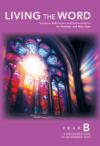Scripture Study for
Twenty-Sixth Sunday in Ordinary Time
Amos 6:1a, 4–7 / Psalm 146:1b / 1 Timothy 6:11–16 / Luke 16:19–31
<< Back to LECTIONARY RESOURCES
Understanding the Word
By Br. John R. Barker, OFM
Last week we heard Amos railing against unjust business practices. This week he focuses on the complacent wealthy who live much better lives than the average Israelite, which gives rise to divine anger. Although the first verse of the reading refers to Zion (Jerusalem), the rest of the reading is directed toward those of the northern kingdom, here referred to as “Joseph” (two of the main tribes of the region, Manasseh and Ephraim, were named for the sons of Joseph). While the average Israelite hardly ever ate meat, the wealthy were reclining at table, banqueting on lamb and veal, listening to fine music, and drinking so much wine they use bowls instead of cups. As they enjoy themselves at others’ expense, or at least heedless of the suffering around them, they are blind to the disaster approaching, as God sends the Assyrian Empire to bring judgment on “Joseph.” They are, so to speak, fiddling while Rome is burning.
Paul has emphasized to Timothy the vital importance of maintaining sound teaching and discerning and refuting false and misleading teaching. This apparently was a difficult and never-ending task in Ephesus, where Timothy was. It required perseverance, lest one either fail in the task or become bitter, losing “love, patience, and gentleness” in the process. Using one of his favorite metaphors (1 Corinthians 9:24–27; 2 Timothy 4:7), Paul urges Timothy to “compete well for the faith,” as an athlete runs the race to the finish, in this case to eternal life when Christ comes again. Timothy’s noble confession, which he most likely made at his baptism, mirrors that of Christ. Both have been publicly faithful to the truth in the face of fierce and even dangerous opposition.
The story of the nameless rich man and Lazarus reflects the profound reversal of fortune Jesus had already proclaimed in the Beatitudes (Luke 6:20–21, 24–25). As the story progresses it becomes clear that the rich man’s sin was not being wealthy; his heart has become warped to such a degree that he cannot cross the chasm between heaven and hell. Not only did he ignore Lazarus while both were still alive, but even in death he acts as if Lazarus owes him something. He demands that Abraham send Lazarus to relieve his suffering, and then he begs him to send Lazarus to warn his brothers. The arrogance and blindness that may have stemmed from a complacency born of his wealth explains his fate. But he had absolutely no excuse, for the law and the prophets repeatedly warned him of the dangers of wealth and of ignoring the needy at his door.
